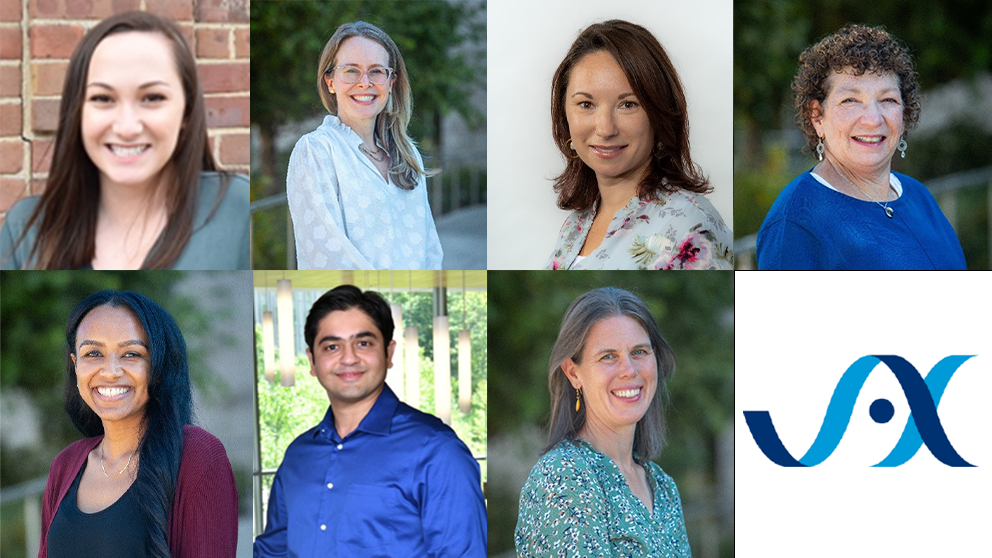 (clockwise from upper left) Elizabeth Charnysh, MS, CGC; Emily Edelman, MS, CGC; Lindsey Kelley, MPH, MS, CGC; Linda Steinmark, MS, CGC; Kate Reed, MPH, ScM, CGC; Kunal Sanghavi, MBBS, MS, CGC; Kalisi Logan, MS, CGC
(clockwise from upper left) Elizabeth Charnysh, MS, CGC; Emily Edelman, MS, CGC; Lindsey Kelley, MPH, MS, CGC; Linda Steinmark, MS, CGC; Kate Reed, MPH, ScM, CGC; Kunal Sanghavi, MBBS, MS, CGC; Kalisi Logan, MS, CGC
Genetic counselors at The Jackson Laboratory (JAX) impact research and clinical education, developing and implementing initiatives that improve clinical care. Below are the top five ways JAX genetic counselors creatively use their specialized training to advance genomics research and utilization of genomics in health care.
- Exploring the ethical, legal and policy implications of genomics
Kunal Sanghavi and Elizabeth Charnysh lead the implementation of an NHGRI-funded R01 project studying the ethical, legal, social and policy implications of workplace genomic testing. More than 157 million people in the US receive their health insurance through employer health plans. A growing number of employers are offering workplace genetic testing to their employees. However, this raises substantial legal and policy concerns including the privacy of genetic information. Given the expectation that it will become more prevalent in the future, there is an urgent need to understand the benefits and risks of workplace genetic testing.
- Exploring new technologies to find answers in rare disease
Partnering with institutions such as Connecticut Children’s Medical Center and UConn, Kunal and Liz support and coordinate research studies that explore genomic sequencing technologies in the pediatric population, particularly long-read whole genome sequencing (LR-WGS). One study is assessing LR-WGS’s feasibility for undiagnosed pediatric patients, describing variants identified and supporting the identification of diagnoses for children with suspected inherited medical conditions who have had inconclusive genetic testing. JAX GCs also work with the CLIA lab to inform providers about research findings that warrant clinical confirmation.
- Moving genomics into clinical care
The Clinical Education Program (CEP) at JAX includes four genetic counselors: Emily Edelman, Kate Reed, Linda Steinmark and Kalisi Logan. CEP helps integrate genetic and genomic medicine into clinical care through education for healthcare providers. Because many clinicians receive minimal genetics instruction during their training, they may be less prepared to use emerging genomic technologies. By expanding the genomic literacy of healthcare providers, CEP increases clinicians’ confidence applying genomics in practice. Their programs address specific clinical needs, such as:
- identifying patients who may benefit from testing,
- interpreting genetic and genomic test results for patient management decisions
- communicating with patients about genomic information
- Realizing the benefits of precision medicine in cancer care
Lindsey Kelley provides genomic navigation to community oncologists and patients in Maine through the Maine Cancer Genomics Initiative (MCGI). This initiative provides Maine oncologists with clinical education and genomic tumor boards to increase their understanding of cancer genomics. Lindsey is committed to increasing patient awareness and understanding of precision oncology.
Kate Reed leads CEP’s efforts to support oncology clinicians working in community settings, where most cancer patients receive their care. CEP has a suite of precision oncology educational resources that are freely available, including:
- case-based educational courses,
- recorded webinars with experts in the field
- targeted resources on specific topics
CEP is also using these resources to support a randomized trial jointly run by MCGI and Columbia University. The goal of this study is to assess the impact of educationally enhanced genomic tumor boards on community oncologists’ use of genome-informed treatments.
Kunal and Liz are leading a mixed-methods study to assess perspectives on somatic and germline cancer genetic testing among oncologists, non-physician oncology clinicians and primary care physicians.
- Fostering a strong genetic counseling community in Connecticut and beyond
JAX genetic counselors contribute to genetic counseling communities at all levels. Lindsey collaborates with Maine genetic counselors about cancer care and access to genetic services. Emily, Kate and Kalisi have leadership roles in national genetics organizations related to genetic counselor education, accreditation and professional development. Kunal is active in several international networks.
Engaging with the Connecticut genetics community, Linda and Kunal led efforts to form the Connecticut Genetic Counselors’ Association (CTGCA). CTGCA fosters, supports and strengthens the network of genetics professionals in the state. JAX provides a welcoming home for the CTGCA, offering facilities and support for the CTGCA annual education conferences.
JAX genetic counselors support students by providing experiential rotations and opportunities to gain exposure to future career paths and JAX research in genomic science.
Genetic counselors bring their training in genomics, counseling and patient care to JAX and apply these skills in new and collaborative ways: as content experts, as research partners, as patient advocates. Through these efforts, JAX genetic counselors advance JAX’s mission to empower the biomedical community to improve human health.